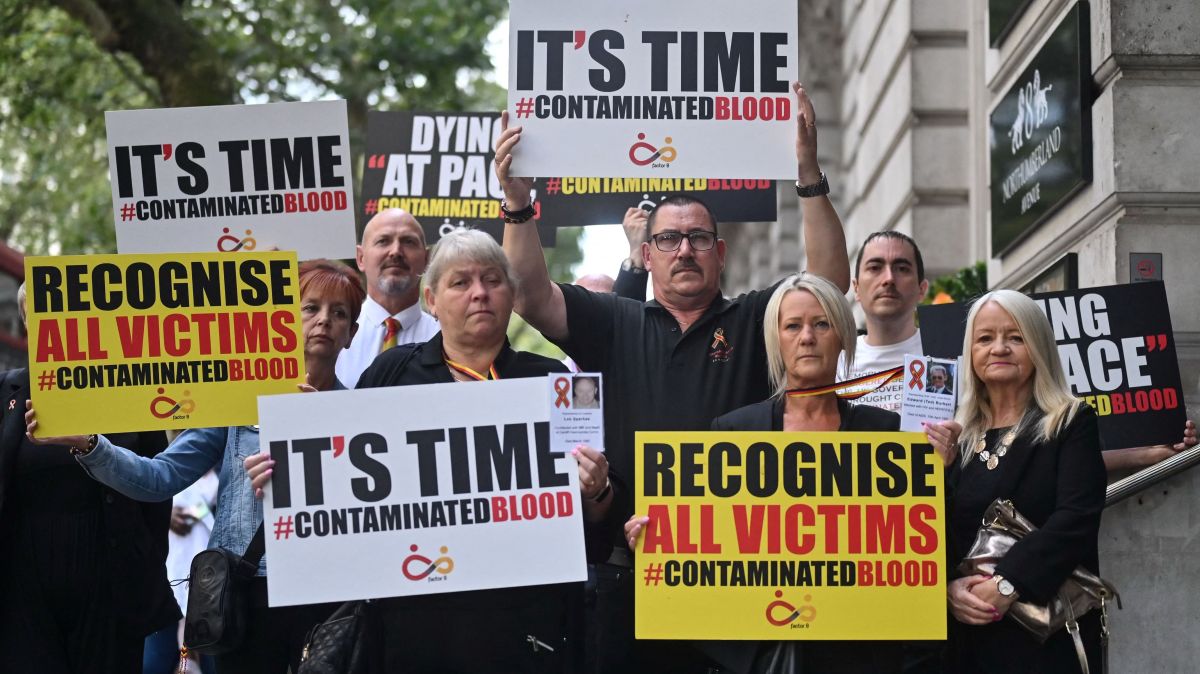HM Revenue & Customs has been accused of snubbing the victims of some of Britain’s worst scandals, who face handing almost half their compensation back to the government.
Ministers had promised that money paid to dead victims of the infected blood and Post Office IT fiascos would be free from inheritance tax, capital gains tax and income tax.
But lawyers representing the families have discovered that this only applies to the first transfer of money from a victim’s estate. If the money went to a victim’s spouse or civil partner — many of whom are in their eighties and nineties — and they then passed it on to their children, that would be a second transfer and could be subject to inheritance tax at 40 per cent.
• Families hit by Britain’s worst scandals face inheritance tax threat
The issue has been compounded by decades of delays suffered by victims seeking justice. Lawyers say months of pleading with HMRC to change the rules and ensure that bereaved families are exempt from inheritance tax have been ignored.
The Society of Trust and Estate Practitioners (STEP), a trade group for estate planners, and the Association of Lifetime Lawyers have written to Rachel Reeves, the chancellor, asking for an urgent fix to what they say is a devastating flaw in the compensation system.
Emily Deane from STEP said: “It has been months since we first provided HMRC with a straightforward and compassionate legislative fix, and we are still waiting for a response and action. This is completely unacceptable. We are saddened, outraged and frustrated that there is no level of urgency.”
HMRC said that it was the UK’s tax authority, responsible for the collection of taxes, but not responsible for tax legislation, which is down to the government.
The scandal
More than 30,000 people in the UK were treated with contaminated blood in the 1970s and 1980s, infecting them with HIV and hepatitis C. More than 3,000 have already died, and there are estimated to be about 140,000 bereaved parents, children and siblings of the victims.
More than £11.8 billion was set aside as compensation, which includes money for infected victims and those affected by the scandal, such as partners and children. This came after a public inquiry which found that the scale of the scandal had been covered up by authorities for decades — a critical time during which many victims died without seeing justice.
For the compensation to go to a child or someone other than a spouse inheritance tax-free, that recipient would have to be specified in the victim’s will as the beneficiary of the first transfer — not something that is possible for the children of victims who have died.
Because of the long delays to compensation payments many surviving beneficiaries are also now in their eighties and nineties, and will not have enough time to give away their money tax-free. Gifts fall out of your estate for inheritance tax purposes if you live for seven years after they are made.
The first £325,000 value of an estate is free from inheritance tax (£500,000 if it is worth less than £2 million and includes a main home left to a direct descendant). Spouses or civil partners can inherit without paying inheritance tax, and they can also inherit each other’s allowances, meaning a couple can pass on up to £1 million inheritance tax-free.
• Delaying payouts for blood and Post Office victims is scandalous
But with some blood scandal compensation payments set to hit £2 million and many in line to get about £1 million, it is likely that most victims’ estates will breach the allowances.
Jade Gani from the Association of Lifetime Lawyers said: “Victims and their families have already endured decades of pain and delay, it is an outrage that a technical flaw will allow the government to claw back up to 40 per cent of the compensation that was specifically intended to provide some redress.
“This is about preventing bereaved families from being actively punished by a tax system that, in effect, rewards the government for delays.”
The fix
A beneficiary of a will has the option to redirect money to new beneficiaries, through a deed of variation. It is a legal document that alters how a person’s estate is distributed after they die and allows someone who inherited from the estate to give away part or all of their share.
If done within two years of death, the change will be treated as if the deceased included them in the original will, meaning that compensation could be exempt from inheritance tax.
This, however, is not an option for the beneficiaries of many infected blood victims, who died more than two years ago.
STEP and the Association of Lifetime Lawyers have called for the two-year limit to begin at the time compensation is paid, rather than death, which would give the initial beneficiary time to ensure that family members benefit from the tax exemption.
The proposed fix would also help victims of the Post Office and Windrush scandals, who also face inheritance tax on their compensation payouts.
The Cabinet Office said: “We have acted to deliver compensation as quickly as possible because we recognise that justice delayed is no justice at all.
“We have ensured victims’ compensation is exempt from inheritance tax when applied to the estate of the person to whom the compensation payment was made. This relief does not extend to subsequent beneficiaries of the deceased person’s estate.”
